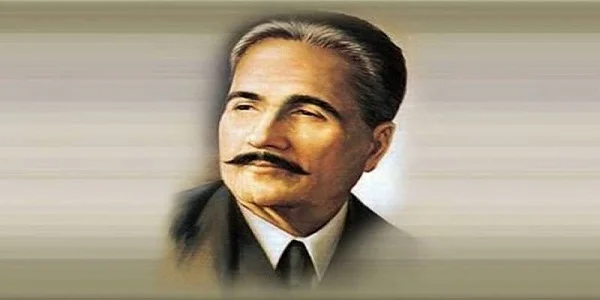Allam Muhammad Iqbal
Allama Muhammad Iqbal, often referred to as Mufakkir-e-Pakistan (The Thinker of Pakistan) and Shair-e-Mashriq (The Poet of the East), was a distinguished philosopher, poet, and politician who played a pivotal role in the intellectual and political landscape of South Asia during the early 20th century. Born on November 9, 1877, in Sialkot, British India (now in Pakistan), Iqbal's life journey encompassed a remarkable evolution from a poet of the Urdu and Persian languages to a visionary thinker and advocate for the rights and upliftment of Muslims in the Indian subcontinent.
Life and Education:
Iqbal hailed from a humble background, with his father, Sheikh Noor Muhammad, being a tailor. Despite financial constraints, Iqbal's thirst for knowledge and intellectual curiosity led him to pursue education relentlessly. He exhibited a prodigious intellect from a young age, mastering multiple languages, including Arabic, Persian, and English. His early education took place in Sialkot, and he later went on to study at Government College in Lahore, where he excelled in literature and philosophy.
Iqbal's academic journey continued in Europe, where he pursued higher studies at Cambridge and Munich universities. The exposure to Western philosophy and literature profoundly influenced his intellectual development. During his time in Europe, Iqbal not only gained academic insights but also witnessed the socio-political dynamics that shaped his perspective on the world.
Literary Contributions:
Allama Iqbal's literary contributions are immense and diverse, covering a wide range of genres, including poetry, prose, and essays. He wrote primarily in Persian and Urdu, crafting verses that reflected his deep philosophical and spiritual musings. Iqbal's poetry is characterized by its profound philosophical depth, spiritual resonance, and a fervent desire for social and political reform.
His Persian work, particularly the collections "Asrar-e-Khudi" (Secrets of the Self) and "Rumuz-i-Bekhudi" (The Secrets of Selflessness), delves into themes of self-discovery, individualism, and the spiritual journey. These poems not only showcase Iqbal's command over the Persian language but also reveal his mastery in expressing complex philosophical ideas through the medium of poetry.
In Urdu, Iqbal's notable works include the Bang-e-Dra (The Call of the Marching Bell) and Bal-e-Jibril (Gabriel's Wing). His poetry in these collections is a rich tapestry of themes ranging from the beauty of nature to the struggles of the individual in the quest for selfhood. Iqbal's verses often carry a universal message that transcends cultural and linguistic boundaries.
Philosophy and Vision:
Allama Iqbal's philosophical outlook underwent a significant transformation over the years. Initially influenced by Western philosophy, especially the ideas of Nietzsche and Bergson, he later turned towards Islamic mysticism and spirituality. Iqbal's vision aimed at reconciling the spiritual and material aspects of human existence, synthesizing the best elements of both Eastern and Western thought.
Central to Iqbal's philosophy was the concept of "Khudi" or selfhood. He emphasized the development of individual character and self-awareness as essential for personal and collective progress. Iqbal believed that a society composed of individuals with a strong sense of self could contribute to the advancement of humanity as a whole.
Iqbal's philosophical ideas also found expression in his political vision for the Muslim community in the Indian subcontinent. He ardently advocated for the creation of a separate Muslim state where Muslims could practice their faith freely and contribute to the development of a just and equitable society.
Political Activism:
Allama Iqbal's involvement in politics was a natural extension of his philosophical and social ideals. He actively participated in the political discourse of his time, advocating for the rights and upliftment of Muslims in British India. Iqbal's famous Allahabad Address in 1930 is considered a watershed moment in the demand for a separate Muslim state, eventually leading to the creation of Pakistan in 1947.
Iqbal's vision for Pakistan was not merely a geographical division but a dream of a society based on Islamic principles, justice, and equality. He envisioned a state where individuals could realize their full potential while contributing to the greater good of the community. Iqbal's influence on the creation of Pakistan earned him the title of "Mufakkir-e-Pakistan" or The Thinker of Pakistan.
Legacy and Impact:
Allama Iqbal's legacy extends far beyond his role as a poet and philosopher. His ideas continue to resonate in the cultural, intellectual, and political spheres of South Asia. Iqbal's poetry, with its timeless themes and messages, remains a source of inspiration for individuals seeking meaning and purpose in life.
In Pakistan, Iqbal is revered as the spiritual father of the nation, and his birthday is celebrated as a national holiday. His poetry is recited and studied in schools and universities, and his philosophical ideas are invoked in discussions about the identity and direction of the country.
Beyond Pakistan, Iqbal's influence can be seen in the broader Islamic world, where his messages of self-discovery, spiritual awakening, and social justice find resonance. Scholars and thinkers continue to engage with his works, exploring the depths of his philosophical insights.
Allama Muhammad Iqbal's life and work encompass a rich tapestry of intellectual, literary, and political achievements. From a young poet with a passion for literature to a visionary philosopher shaping the destiny of a nation, Iqbal's journey is one of intellectual evolution and profound impact.
His enduring legacy lies not only in the verses of his poetry but also in the ideals he championed – the importance of selfhood, the synthesis of Eastern and Western thought, and the pursuit of justice and equality. Allama Iqbal's contributions have left an indelible mark on the cultural and intellectual heritage of South Asia, making him a revered figure whose influence transcends borders and generations.

